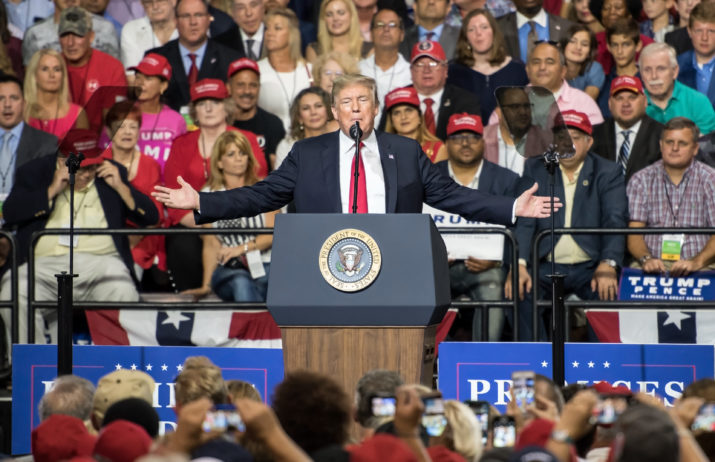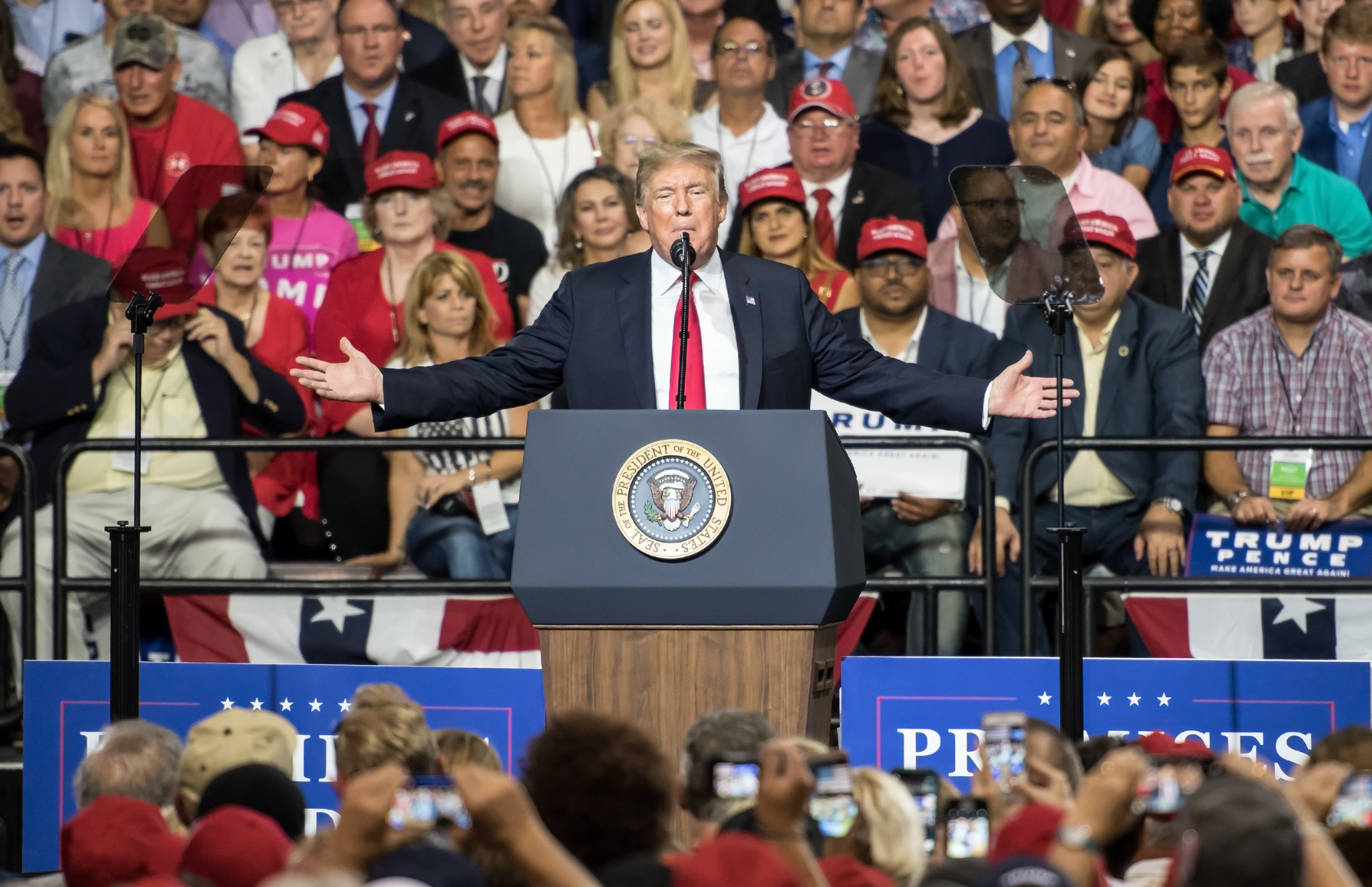

As we approach the two-year mark of the Trump Presidency, the implications and the effects of the “America First” policy are becoming clear. Supporters of the multilateral rules-based world order are alarmed. We are witnessing the end of Pax Americana; the end of a generally benign U.S. hegemony; the end of U.S. support for a global system created by America and her allies after the Second World War. America First heralds the return of mercantilism. This unravelling of globalization, free trade, and worldwide value chains, will have negative economic implications for us all. And we were warned. Donald Trump has been open about his disdain for many aspects of the international global system since the 1990s.
Decades before Donald Trump won the presidency in a surprise upset to the political establishment and propelled by the rage of those left behind, those disdained by the establishment, those who appear to be, as Arlie Hochschild has stated so eloquently, “strangers in their own land,”[1] Donald Trump was attacking the trading system and globalization. As early as 1993, Trump took aim at NAFTA. Moreover, Trump has been critical of our relations with China since the early 2000s. Today, although Trump’s tweets keep Washington diplomats awake at night, they are consistent with the president’s past positions (and his 2016 campaign pledges). In a fundamental way, the 2016 election was a refutation of the liberal internationalist economic norms of the recent past, of the Obama, Bush 1, Clinton, and Bush 2, presidencies. President Trump made clear in his inaugural address he would put America First.
With America First, everyone else comes second, or worse. The echoes of the 1930s and isolationism of that era reverberate. The president has publicly and proudly abrogated American leadership of the global system. He did so in his shocking refusal to sign the 2018 G7 Communique, and in his rejection of the – diplomatically normal and anodyne – standard reference to support a “rules-based international order.”[2] The president also drove the point home in his 2018 UN speech, stating, “We reject the ideology of globalism and accept the doctrine of patriotism.”[3] America First has worrying implications for the global trading system.
Today, the international rules-based system of trade diplomacy faces its most serious challenge since 1944. The World Trade Organization is moribund. The dispute settlement procedure is barely functioning, with a minimum of three judges serving. By the end of this year, it will cease to function as more WTO judges face retirement, if they are not replaced. No trade talks at the WTO level are on the horizon. Global multilateral deals are no more. Indeed, the president has repeatedly threatened to leave the WTO if rulings go against the U.S., which is possible. Meanwhile, the evidence suggests new bilateral deals, such as they are, could lead to a more fractured, more complex, less free and less fair, trading system. Less fair because it will favor the larger states, and disadvantage the smaller and weaker states. In addition, the replacement of common global standards with a patchwork of bilateral deals is inherently more complex, less efficient, and harder to navigate for large and small businesses alike.
The bilateral deals are being driven by senior staff hostile to the international architecture. Peter Navarro, Assistant to the President Director of Trade and Industrial Policy, and the author of Death by China, echoes President’s Trump’s views.[4] In a similar vein, Robert Lighthizer, the United States Trade Representative (USTR), spent decades as a litigator defending U.S. steel producers against cheap Chinese and Korean imports.[5] USTR Lighthizer and his team of hand-picked deputies come to the negotiating table with this particularly hostile viewpoint on the utility of the WTO and free trade.
Deal making is not, for this White House, about seeking common ground. For America to win others must lose. If others appear to have done well then ipso facto America must have lost. This reflects the president’s past as a real estate developer. President Trump is used to offering a deal and walking away if he is unhappy with the response. This simplicity, a take it or leave it mantra, is not realistic in international diplomacy, which requires complex trade-offs and understandings drawn out over many years across many fields. The Trump approach to diplomacy is not a recipe for comity and smooth diplomatic relations with allies or adversaries. Practiced negotiators will tell you that the Trump approach is not how you get to a credible deal. You need to recognize and understand your opponent’s viewpoint, their bottom line, what you can give ground on to provide, what Robert Putnam calls “win sets”[6] that both sides can claim as a victory.
Trade talks are being pushed based on a take it or leave it approach. The new U.S.- Mexico-Canada-Agreement (USMCA) is a worse agreement for both countries than NAFTA. The new agreement includes tougher local content requirements and wage minimums. Both may make the USMCA trade area less profitable for firms relying on integrated supply chains. Nonetheless, the deal was the best we could expect from a President whose impulse (as reported in Fear[7] and Fire and Fury[8]), was to abandon NAFTA completely. We know this was only avoided by then U.S. National Economic Council Chair Gary Cohn’s decision to take the NAFTA exit-letter off the president’s desk before he could sign it.
Looking ahead – other than a desperate friendless Brexit UK – few countries are willing to submit themselves to this type of non-negotiation. Why? Because the administration asks for capitulation, not negotiation. There is little effort by the U.S. side to understand the other’s needs or position. And American demands are set in stone. I don’t expect many countries to step forward to get crumby deals after being forced to eat diplomatic crow. As we face the end of Pax Americana, an end to multilateralism, the rise of mercantilism, and of America First, what should be done by allies and supporters of a global architecture that has served countries well?
First, defenders of the international system must plan for America’s absence. Internationalist leaders must prepare for a post-American world, and plan scenarios, on climate change, on foreign policy hot-spots, on new trade deals, without the United States in its historically supportive role. For this American leadership interregnum may last six further long years. It is quite likely that President Trump will win a second term, with American unemployment at 3.7 percent, a 49-year low. Normally, presidents are reelected if the economy is strong in their first term, and in general, sitting presidents are favored to win a second term. A great deal of damage could be done to the international system of cooperation and coordination in that time. Governments are waking up to this stark reality.
Second, reconfigured coalitions will be needed to defend the rules-based system. These coalitions, without the U.S., and when possible alongside China, should be sought. President Xi Jingping of China is already taking on the mantle as a key defender of globalization, at the World Economic Forum and the United Nations, and this suggests he may be a willing partner. Xi understands he must defend rules upon which China’s economic prosperity and future success rests. Trump’s America First policy hastens America’s relative geopolitical decline and undermines the effectiveness of its soft power, rather than strengthening its position. As America voluntarily walks away from hegemonic leadership of the global system, others, including China, look set to step into the gap and help shore up the international system. The European Union also has a crucial role to play.
Third, the European Union and its leaders must step forward and vigorously defend the international rules-based system, rather than see individual countries jockeying for individual short-term advantage via pandering to a fickle and fast-to-anger president. President Macron is right to declare: “Do not accept the erosion of multilateralism, …Don’t accept our history unraveling.”[9] EU governments must support the system that has underpinned peace, political integration, economic globalization, and a massive expansion of global GDP. Europe must continue to take the lead in many areas, such as on climate change, on the defense of the International Criminal Court, on the need for a well-functioning and updated World Trade Organization, and on globally coordinated economic (via the G20) and financial regulation (via the Financial Stability Board). This architecture, built up over decades, must be buttressed, protected from demolition. But this alone is not enough. The source of voters’ electrical anger and discontent must also be addressed head-on.
Crucially, governments must do much more for voters and workers who are left behind as the digital economy and gig economy takes hold and shifts the ground from under people’s feet yet again. The overused and politically unconvincing argument that in general, on average, open trade is good for the world, is true but totally insufficient. It fails to address the needs and understandable anger of those left behind by globalization; the unemployed of Marseille; the underpaid and hopeless in Athens; the young and frustrated in Berlin or Barcelona. To defend and support globalization requires governments to directly address the economic downside of liberalization. Governments must provide training, new opportunities, and social welfare support for the losers from free trade. Not doing so would be very foolish and short-sighted, and would almost certainly ensure the continuous fall of voter support for trade.
Failure to defend globalization while strengthening its economic and societal foundations risks a further erosion of the center-left-center-right political foundation upon which the world’s, and particularly Europe’s, collective stability and future prosperity rests. If support for mainstream parties’ collapses, as some on the center-left have already done (in France, in Germany, in Poland, in Hungary, and others), the electoral basis for consensus and economic progress fractures.
Today, populism is surging. It could rise higher still. How Democracies Die[10] warns us and history shows us that elected autocracies are born out of anger, nativism, and nationalism, and democracies can weaken and crumble when voters are angry, alienated, and looking for an “us” versus “them” answer. Solving the challenges facing globalization and free trade requires that we defend globalization and the architecture of institutions and norms that underpin free trade, while also providing real solutions for the real negative economic spillover effects upon voters and our societies.
Stuart P.M. Mackintosh is Executive Director of the Group of Thirty, an international financial think tank, composed of senior figures from central banking, global finance, and academia. He is based in Washington DC. The views expressed are those of the author and do not represent the position of the G30 or of its members.
Photo: Tampa, Florida – July 31, 2018: President Donald Trump addresses his supporters at a rally in Tampa, Florida, on July 31, 2018 | Shutterstock
References:
[1] Hochschild, A. (2018). Strangers in their own land. New Press
[2] Calamur, K. (2018). “America Alone?”. The Atlantic. June 10. Available online – https://www.theatlantic.com/international/archive/2018/06/trump-g7/562493/ Accessed October 8, 2018.
[3] Ward, A. “Trump’s speech to the UN General Assembly.” September 25. Vox. Available online – https://www.vox.com/2018/9/25/17901082/trump-un-2018-speech-full-text , Accessed October 8, 2018.
[4] Navarro, P. (2011) Death by China: confronting the dragon – a call for action. Pearson FT.
[5] See – Biographical sketch of USTR Lighthizer. Available online – . https://ustr.gov/about-us/biographies-key-officials/united-states-trade-representative-robert-e-lighthizer , Accessed October 8, 2018.
[6] Putnam, R., Bayne n. (1984). Hanging together. Harvard. Harvard University Press
[7] Woodward, R. (2018). Fear. Simon and Schuster
[8] Wolfe, M. (2018). Fire and fury. Henry Holt & Co.
[9] French President Macron defends multilateralism, Paris Agreement. Xinhau. June 26, 2018. Available online – http://www.xinhuanet.com/english/2018-09/26/c_137492523.htm Accessed, October 8, 2018.
[10] Ziblatt, D, Levitsky, S (2018). How democracies die. New York. Crown.
Published on November 8, 2018.




